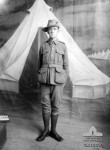SYME, Joseph Edward
Joseph Edward Syme was the son of George Alexander Syme and the grand-son of Ebenezer Syme, proprietor, with his brother David, of The Age newspaper. George was a partner in Daunt, Syme & Co., general merchants, based in Brisbane. He had married Julia Tierney and after his death in 1885 at the age of 34 she married William Henry Glover. In 1914 William Glover was manager of Cliveden Mansions in Wellington Parade, and it was this address that Jospeh gave as his own on embarkation, and that of his next of kin, his mother.
Joseph was born in Rockhampton, Queensland, in 1881. In 1904 he graduated from the Hawkesbury Agricultural College as dux. In 1913, and then described as 'of Phillip Island', he was appointed manager of the newly established Batchelor Experiment Farm in the Northern Territory. When he enlisted on 24 September 1915 he described himself simply as a farmer.
He embarked with the 5th Battalion, 14th Reinforcements on 28 January 1916 on board HMAT Themistocles and disembarked at Alexandria a month later. On 8 April 1916 he was transferred to the 60th Battalion and in June the battalion sailed for France. On 19 July 1916 Joseph was wounded in action with a gunshot to his left leg which fractured his tibia.
The Australian War Memorial's Unit History explains that the newly arrived 60th Battalion had become 'embroiled in its first major battle on the Western Front on 19 July, without the benefit of an introduction to the trenches in a "quiet" sector. The battle of Fromelles was a disaster for the battalion In a single day, it was virtually wiped out, suffering 757 casualites.'
Joseph was sent to England for hospitalisation and was returned to Australia on Hospital Ship Kanowna on 9 September 1916. He was discharged permanently unfit for service on 23 January 1917.
After the war it seems he briefly returned to Phillip Island as this was the address given in a memo stating that his pension had been reduced from 30/- to 20/- per fortnight from 16 August 1917. Later his address is given a Yarrandale Soldiers' Settlement, Armatree, NSW. By September 1918 he had been appointed assistant inspector of Agriculture in the western district (NSW), but at the end of 1920 it was reported that he would retire from that position to 'undertake wheat growing on his own account'.
He died on Christmas Day 1959 in New South Wales. His connection with East Melbourne was fleeting at most.

